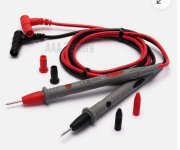so i can use this tester feature to test all transistors ? so just to extend wires from big transistors and to put them in tester holes ? and what reading should i expect if it works or if its bad ?
You should have probes for your meter that plug in banana jacks on the meter face. These probes have extended plastic covers to protect your hands from high voltages (>25). You touch the probes to the legs of the transistor or diode, in circuit.
Modern meters sold in stores have shortened the metal part of the probe as to be abolutely useless for medium voltage electronics. 1 mm tip will not reach anything but 480 VAC terminals in factory electrical panels. These longer probes should not be used above 240 volts. Do not use exposed metal probes in saltwater environments like ships & beaches. My last source parts-express.com has stopped stocking exposed metal probes, thus bowing to the wishes of the lawyers who wish to punish everybody that ever repairs anything. Lawyers want all products sent directly to the dump or authorized electronics recycling center (for money).
Modern meters sold in stores have shortened the metal part of the probe as to be abolutely useless for medium voltage electronics. 1 mm tip will not reach anything but 480 VAC terminals in factory electrical panels. These longer probes should not be used above 240 volts. Do not use exposed metal probes in saltwater environments like ships & beaches. My last source parts-express.com has stopped stocking exposed metal probes, thus bowing to the wishes of the lawyers who wish to punish everybody that ever repairs anything. Lawyers want all products sent directly to the dump or authorized electronics recycling center (for money).
Attachments
Last edited:
3 am actually xdd but i dont go to sleep before 6 xddd btw thanks for everything, i will test transistor again and change resistors i hope thati can power it on then
Testing a live circuit can be safe if you limit the energy with a light bulb limiter, don't probe the AC mains area before the transformer, and use only one hand. Alligator clip leads can be used in the AC mains area as long as you put the alligator clips on the mains voltage wiring BEFORE you turn on the power and do not touch them while power is live.
Yes, The bulb is connected in series from the mains to the amplifier.

I guess that depends where you buy your bulb. If a bulb is rated for 220 and it is 60 watt, that should be the end of it, although I understand your question.
If the amplifier draws 60W at 110V, it will still draw 60W if rewired its transformer to 220V.
However, P =V x I ( I = P / V )
A 60W/110V bulb consumes 0.55A current at 110V, and a 60W/220V bulb consumes approximately 0.27A current at 220V mains voltage.
The purpose of connecting a 60W/220V bulb in series to the amplifier is to limit the maximum current draw to 0.27A to protect your amplifier.
However, P =V x I ( I = P / V )
A 60W/110V bulb consumes 0.55A current at 110V, and a 60W/220V bulb consumes approximately 0.27A current at 220V mains voltage.
The purpose of connecting a 60W/220V bulb in series to the amplifier is to limit the maximum current draw to 0.27A to protect your amplifier.
in my home i have only one 75w bulb. for 220v rest is led i think its rare to find new bulbs like that anymore maybe i am wrong but its not common. i have 75w is it ok to use ?
I'm not sure how else you could interpret these responses. It was the reason in the first place that the dim bulb tester was brought up.
my question is can i use 75w bulb i dont have 60w , other that i have are led and cannot be used here
- Home
- Amplifiers
- Solid State
- transistor amp not working after shorting output

